Are you looking to buy a Predator generator but confused by all the different types of fuel, capacities, and run times available?
If so, then this guide is for you; this will help you make an informed decision about which type of Predator generator fuel types, capacity & runtime best suits your needs.
It covers everything from fuel types to capacity and runs time in detail so that you can choose the right one for your situation. Whether for home use or commercial purposes, this guide has all the information required to ensure that your purchase meets all your requirements.
You’ll discover what kind of fuel works best with each type of generator and how much power they can produce at peak times as well as regular running times.
We’ll also discuss safety tips when using generators and provide helpful advice on maintenance schedules and options available to extend the life span of your new purchase.
Types Of Fuel Used In Predator Generators
Predator generators can run on various fuel sources, depending on the model and type. Here are the main types of fuel you’ll find in Predator generators.

87+ Octane, Stabilizer-treated Unleaded Gasoline
When it comes to fuel types for Predator generators, one option is 87+ octane, stabilizer-treated unleaded gasoline. This type of gasoline is commonly used in Predator generators, and portable generators as it is readily available at gas stations and has a longer shelf life compared to other gasoline types.
The stabilizer added to the gasoline helps to prevent the fuel from breaking down and causing engine problems over time.
Diesel
Diesel engines are typically the preferred choice for heavy-duty generators as they offer more reliability, durability, and fuel efficiency than other fuel types. These diesel engines can produce much more power than gasoline engines while also being more efficient in terms of fuel consumption.
Gasoline
Gasoline is another popular option for home and RV use due to its portability, affordability, and availability of fuel. However, they need regular maintenance and upkeep to ensure optimal performance, as they aren’t as reliable or efficient as diesel engines.
Natural gas-powered
Natural gas-powered generators are an excellent choice for large-scale operations as they produce a steady supply of power over long periods with low emissions. These generators require specialized parts and may not be suitable for all locations depending on the availability of natural gas lines
How to choose the right fuel option for your Predator generatora
Choosing the right fuel option for your Predator generator is crucial for optimal performance and longevity. Here are the steps to follow.

Determine your power needs: Assess the wattage requirements of the appliances or equipment you intend to power with the generator. This will help you choose the appropriate generator size and fuel option.
Consider your usage frequency: Do you plan on using the generator occasionally or regularly? Fuel type and storage requirements can vary based on usage frequency.
Evaluate fuel availability: Check the availability of various fuel types in your area. If you have easy access to gasoline, it may be a better option than diesel or natural gas.
Determine maintenance requirements: Different fuel types have varying maintenance needs, which can affect the overall cost of ownership. Gasoline engines require more frequent maintenance than diesel engines, for example.
Consider emission regulations: Some areas have strict emission regulations that may limit your fuel options. Diesel engines, for instance, are subject to more rigorous emission standards than gasoline engines.
By following these steps, you can make an informed decision that meets your power needs, usage frequency, fuel availability, maintenance requirements, and emission regulations.
Honda GCV160 Spark Plug Gap and Socket Size: Detailed Guide
Factors That Affect The Run Time Of A Predator Generator
The run time of a Predator Generator is affected by multiple factors. Several factors can affect the run time of a Predator generator, including the factors given below.

1. Fuel type: Different fuel types burn at different rates, which affects how long the generator can run. For example, diesel engines may run longer than gasoline engines on the same amount of fuel due to their higher fuel efficiency.
2. Power output: The higher the power output of the generator, the faster it will consume fuel and the shorter the run time will be.
3. Load: The amount of power being drawn from the generator can also affect the run time. Running a few small appliances will use less power than running larger, heavier appliances.
4. Temperature: Extreme temperatures can affect the performance of the generator and reduce its run time. In cold weather, the generator may take longer to start up, while in hot weather, it may overheat and shut down.
6. Maintenance: Regular maintenance of the generator is essential to ensure it runs at peak performance. Neglected generators can run less efficiently, resulting in shorter run times.
By being aware of these factors and taking steps to optimize the generator’s performance, you can ensure that your Predator generator runs for as long as possible.
Regular maintenance, monitoring power output, and being mindful of fuel type and load can all help maximize the generator’s run time.
The Benefits of Using Propane as a Fuel Source for Your Predator Generator
The benefits of using propane as a fuel source for your Predator generator include:
- Portability and convenience, as propane tanks, are easy to transport and refill.
- Lower emissions compared to gasoline or diesel, making it an environmentally friendly option.
- Cost savings due to its lower cost per unit of energy produced compared to other fuels.
- Longer run times than gasoline or diesel-powered models when used at half-load capacity.
Gasoline Vs Diesel – Which is Best for Your Predator Generator Needs
When it comes to powering a Predator generator, selecting between gasoline and diesel can be an important decision. Understanding the advantages and disadvantages of each fuel type is essential in order to determine which is best for your needs.
Gasoline
Gasoline-powered generators are generally less expensive than their diesel counterparts and widely available, making them popular for smaller applications such as camping or tailgating events. They’re also highly portable and easy to use, with no need for special equipment or setup.
Diesel
Diesel-powered models, on the other hand, have higher efficiency ratings due to their greater fuel economy and can handle heavier loads more effectively than gasoline-powered models. They’re also more reliable and durable due to their higher efficiency rates, making them ideal for heavy-duty applications such as construction sites or industrial facilities.
Ultimately, the choice between gasoline and diesel depends on what you want out of your Predator generator and how you plan on using it. If you only need light power occasionally or you don’t require heavy-duty performance, then a gasoline model may be sufficient; however, if you need more dependable output, then a diesel model will likely suit your needs better as it offers superior durability and reliability in comparison.
Propane Vs Gas Generators: Pros, Cons, Differences
Advantages and disadvantages of using dual fuel options with Predator generators.
The use of dual fuel options with Predator generators offers a range of advantages and disadvantages.
Advantages
One of the primary advantages is the increased flexibility that comes with using dual-fuel options. This allows the user to switch between gas and propane, depending on their needs and the availability of each type of fuel at any given time. The ability to switch fuels also means that if one type isn’t available, another can be used as an alternative, ensuring power won’t be lost due to the unavailability of one kind of fuel.
Another advantage is that when running on propane instead of gasoline, the emissions released are significantly lower than those produced by gasoline-powered models. Propane engines emit less carbon dioxide and hydrocarbons than gasoline engines and are, therefore, more environmentally friendly.
Disadvantages
The main disadvantage associated with using dual-fuel options is a higher cost initially since these kinds of generators tend to be more expensive than traditional single-fuel models.
Furthermore, these types of generators are typically quite heavy due to the two tanks they contain, making them difficult to transport and maneuver around if needed.
Safety Tips When Running A Predator Generator On Alternative Fuels.
When running a Predator generator on alternative fuels such as propane or diesel, it is important to take proper safety precautions to avoid potential injuries or other damages.
Safety Tips should be followed when working with these fuel sources.
Be sure to read and understand the instructions before operating the Predator generator. Familiarize yourself with all of the safety warnings and instructions, as well as any applicable local laws.
- Always keep the area around the generator free of combustible materials such as gasoline, oil, paper, rags, and other flammable items that can ignite and cause an explosion or fire.
- Inspect the fuel tanks regularly for signs of leakage or corrosion. If there is any evidence of leaking fuel or rust on the tank, replace it immediately.
- Make sure that fuel lines are not linked or blocked by debris, which could interfere with fuel flow and cause a dangerous situation.
- Before starting up your generator, ensure that all connections are secure and properly connected according to the manufacturer’s directions.
- When adding gasoline or diesel to your generator’s tank, always use a funnel.
- Never fill up a lit generator, as this can cause it to go out of control very quickly due to excessive heat buildup within the engine casing from combustion occurring inside the tank itself.
- When storing your Predator generator, always remember to turn off its power switch during extended periods of non-use.
- In order to prevent overheating, always ensure that there is ample air circulation around your Predator generator while it is in use.
- Lastly, always make sure you have sufficient supplies on hand before operating a Predator generator so that you know when maintenance needs will arise during its use (i.e., changing oil and filters).
Conclusion
The use of Predator generators with fuel options offers a range of advantages and disadvantages, all depending on your needs. Whether you are looking for increased flexibility or reduced emissions, there is something to be said about considering alternative fuels when it comes to powering your home or business.
However, before making any decisions regarding which type of generator will best suit your needs, make sure that you take into account all safety tips and regulations associated with using these kinds of machines as well as their capacity in terms of run time and fuel types.
Remember the importance of proper maintenance and take all necessary steps to ensure the longevity and effectiveness of your generator as shown in the above content. By doing so, you can ensure that you get the most out of your investment while keeping yourself safe at the same time.

